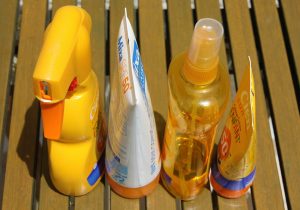Protecting your skin from sun damage
Betty Chaffee/ June 13, 2019/ Uncategorized/ 2 comments
 You've probably heard that the safety of sunscreens has been called into question recently. Indeed, new research published just last month started this important conversation about sunscreen use. But now many people are unsure about how to protect their skin from sun damage and possible skin cancer. Summer is upon us, and many of us hope for some warm, sunny days to be outdoors. Let's talk about what this sunscreen controversy is all about.
You've probably heard that the safety of sunscreens has been called into question recently. Indeed, new research published just last month started this important conversation about sunscreen use. But now many people are unsure about how to protect their skin from sun damage and possible skin cancer. Summer is upon us, and many of us hope for some warm, sunny days to be outdoors. Let's talk about what this sunscreen controversy is all about.
What's the problem?
Sunscreens have been on the market for a long time. The Food and Drug Administration (FDA) originally approved them at a time when safety and efficacy research requirements were less strict than they are now. In recent years, though, it's become clear that more information about the safety and efficacy of sunscreens is needed. In fact, the FDA is pushing hard to make sure manufacturers get started on this research. A new rule proposes labeling changes on some ingredients if studies aren't underway by later this year.
The study I mentioned above is one of the first to show why this type of research is so important. People in the study applied commonly available sunscreens regularly over several days. Their blood was tested multiple times during the study. The results showed that the active chemicals were absorbed into the blood, starting with the first application.
But does that mean sunscreens are dangerous?
Absolutely not!
This study just showed that there's good reason to make sure adequate research is done with sunscreens to learn about their safety. That's no different than the way most medicines are researched. Until now, we've only had good information about how sunscreens work on our skin. Now that we know the chemicals reach our blood, let's find out more about how they work in our bodies.
In short, the fact that sunscreen chemicals get into the blood does NOT mean they are inherently unsafe. It just means we need to start finding out about their safety.
Sunscreens protect against sun damage and skin cancers.
There's been no change in the recommendations of experts to protect the skin against exposure to ultraviolet (UV) rays. Sunscreen lotions, sprays, and creams are effective at this. Experts still recommend these products when no other form of sun protection is being used. Always follow the directions for use on the package, reapplying when necessary.
You can use other methods of skin protection too.
We've been talking about chemical sunscreens. There are also physical sunscreens. Creams or pastes with Zinc Oxide or Titanium Dioxide are effective at blocking UV rays without chemical exposure. The drawback here is that they are more difficult to apply, and since they don't "rub in" they're always visible on the skin.

 Another physical sunscreen is UV-blocking clothing, including hats and sunglasses. And don't forget, there's always the shade of a nearby tree! But remember, skin that's not covered with clothing still needs protection with a physical or chemical sunscreen.
Another physical sunscreen is UV-blocking clothing, including hats and sunglasses. And don't forget, there's always the shade of a nearby tree! But remember, skin that's not covered with clothing still needs protection with a physical or chemical sunscreen.
Your pharmacist is always available to help you choose the product that's right for you!
Ask your pharmacist for help choosing between sunscreen products for adults and kids. Your pharmacist has a wealth of knowledge and experience to help you with all your over-the-counter product needs, as well as questions about prescription medicines. You can ask a question or start a conversation right below this article, or contact us at BetterMyMeds!


Great information and timing, Betty! Also, it is important for people to understand the importance of the proper application of sunscreens (e.g. timing, when to reapply, etc…) along with selecting a sunscreen that would provide adequate protection, especially to those who may be considered at higher risk for burns and future complications.
Great point, Alan. A broad-spectrum sunscreen should be used to protect skin from both UVA and UVB rays. Not only that, but the sun protection factor (SPF) rating is important, too. Many experts recommend using sunscreen with a SPF rating of at least 30. But even then it’s still important to reapply every two hours while in the sun, or after swimming or sweating, to get the necessary protection.